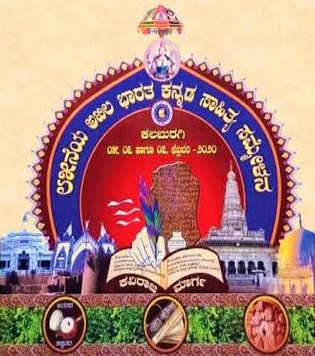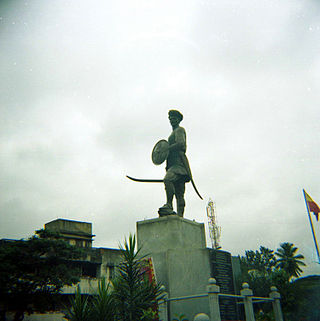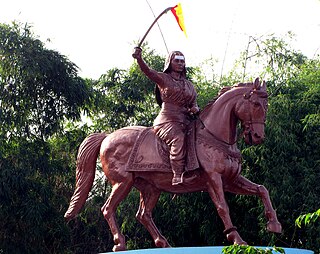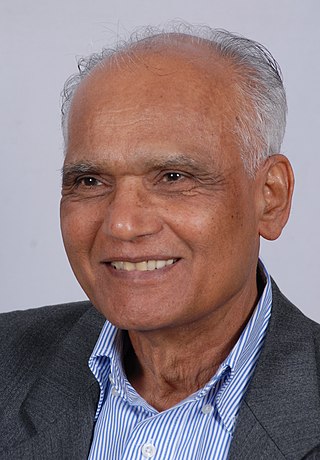
Kota Shivaram Karanth, also abbreviated as K. Shivaram Karanth, was an Indian polymath, who was a novelist in Kannada language, playwright and an ecological conservationist. Ramachandra Guha called him the "Rabindranath Tagore of Modern India, who has been one of the finest novelists-activists since independence". He was the third writer to be decorated with the Jnanpith Award for Kannada, the highest literary honor conferred in India. His son Ullas is an ecological conservationist.
Arebhashe or Aregannada or Gowda Kannada is a dialect of Kannada mainly by Gowda and other communities in the region Madikeri, Somwarpet, and Virajpet taluks of Kodagu district, Sullia, taluks of Dakshina Kannada district; Bangalore and Mysore districts in the Indian state of Karnataka. As well as Bandadka, Kasaragod District in the Indian state of Kerala, Arebhashe is also called Gowda Kannada. The language was recognized by the Karnataka State government and formed an academy in 2011 to preserve the culture and literature of the Arebhahse Region which is named as Karnataka Arebhashe Samskruthi mathu Sahitya Academy supported by then Chief Minister D. V. Sadananda Gowda.

Vinayaka Krishna Gokak, abbreviated in Kannada as Vi. Kru. Gokak, was an Indian historian and writer in the Kannada language and a scholar of English and Kannada literatures. He was the fifth writer to be honoured with the Jnanpith Award in 1990 for Kannada language, for his epic Bharatha Sindhu Rashmi. Bharatha Sindhu Rashmi deals with the Vedic age and is perhaps the longest epic narrative in any language in the 20th Century. In 1961, Gokak was awarded the Padma Shri from the Government of India for Dyava Prithvi.

The Kannada Sahitya Sammelana is the premier gathering of writers, poets and Kannadigas. It is held with the aim of preserving and developing the Kannada language, its literature, art, culture and music. It was started in 1915 by H. V. Nanjundaiah and held at Bangalore. It used to be inaugurated by prominent writers and poets from 1915 to 1948. Since then it has been inaugurated by the Chief Minister of Karnataka. The Kannada Sahitya Parishat is responsible for holding the gathering.

Sangolli Rayanna was born on 15 August 1798 was a nineteenth century Indian revolutionary, military chief (Shetsanadi) and warrior in the Kittur princely state in the present day Indian state of Karnataka. He was the Shetsanadi of the Kingdom of Kittur ruled at the time by Rani Channamma and fought the British East India Company till his death. He died on 26 January 1831, at the age of 33. He belonged to the Kuruba Gowda community. His life was the subject of the 2012 Kannada film Sangolli Rayanna.

Palya Lankesh was an Indian poet, fiction writer, playwright, translator, screenplay writer and journalist who wrote in the Kannada language. He was also an award-winning film director.

Kittur Chennamma was the Indian Queen of Kittur, a former princely state in present-day Karnataka. She led an armed resistance against the British East India Company in 1824, in defiance of the Paramountcy, in an attempt to retain control over her dominion. She defeated the Company in the first revolt, but died as a prisoner of war after the second rebellion. As one of the first and few female rulers to lead rebel forces against British colonisation, she continues to be remembered as a folk hero in Karnataka, she is also an important symbol of the Indian independence movement.

Arakalagudu Narasingarao Krishna Rao, popularly known as Anakru, was an Indian writer. He is one of the best-known writers in the Kannada-language and was popularly known as Kadambari Sarvabhouma. The inception of the Pragatishila ("progressive") movement in Kannada literature is credited to him. He received an honorary doctorate from the Mysore University and is also a recipient of the Karnataka Sahitya Academy Award.
Ankalagi is a village in Gokak taluk, Belagavi district of Karnataka state in southern India. It is situated about 15 miles south-west of Gokak and about 3 miles away from Suladhal railway station and is located on the bank of Markandeya river. It is a big village consisting of 64 small villages. Earlier, all this area was popularly known as "Kundara Nadu" and known for its freedom fighters - Deshpandes'. Ankalagi is also famous for the temple of Shri Adavi Siddeshwara. Surrounding villages include Akkatangerahal, Lagameshwar, Gujanal, Suladhal, Yaddalagudd, budihal Hudali, Pachapur and many more. A weekly market is held on Friday where all village peoples gather and arrange the market.

Malleshappa Madivalappa Kalburgi was an Indian scholar of Vachana sahitya in the Kannada-language and academic who served as the vice-chancellor of Kannada University in Hampi. A noted epigraphist of Kannada, he was awarded the National Sahitya Akademi Award in 2006 for Marga 4, a collection of his research articles.

Santeshivara Lingannaiah Bhyrappa is an Indian novelist, philosopher and screenwriter who writes in Kannada. His work is popular in the state of Karnataka and he is widely regarded as one of modern India's popular novelists. His novels are unique in terms of theme, structure, and characterization. He has been among the top-selling authors in the Kannada language and his books have been translated into Hindi and Marathi which have also been sellers.

Sumathendra Raghavendra Nadig was an Indian professor and writer in Kannada. Nadig came upon the literary scene as a prominent modern poet in the 1960s. He was a close associate of Gopalakrishna Adiga, the leader of the modernist movement.
Girija Lokesh is an Indian theatre and film actress and occasional film producer who works in Kannada cinema. She is wife of actor Lokesh, and is the mother of former actress Pooja Lokesh, and actor and television presenter Srujan Lokesh. In recognition of her contribution towards Kannada cinema, she was honoured with Rajyotsava Award by the Government of Karnataka in 2013.

Chandrashekar Patil, popularly known as Champa, was an Indian poet, playwright and public intellectual writing in Kannada. Patil was a recipient of the Karnataka Sahitya Akademi Award for Poetry in 1989 and the Karnataka state government's Pampa Award in 2009. Patil had served as the president of the Kannada Sahitya Parishat, a Kannada language literary organization.

Kampalapura Veeranna Narayana, also known as KVN, is an Indian linguist, professor of Kannada language and literature, and a literary critic. He is currently the Chairman of the Kuvempu Bhasha Bharathi Pradikara, Government of Karnataka. He hails from Piriyapattana in Mysore district. During his time as a professor in Bangalore University, he initiated investigations into Kannada language and culture from the root level. He served as the registrar of Hampi Kannada University. His major areas of interest are Kannada language, literature, teaching and science.
Sara Aboobacker was an Indian Kannada writer of novels and short stories, and a translator.
Bhargavi Narayan was an Indian actress in the Kannada film industry, and a theatre artist in Karnataka, India. Her notable films include Eradu Kanasu, Hanthakana Sanchu, Pallavi Anupallavi, and Baa Nalle Madhuchandrake.
Dr Lankappa Hanumanthaiah is an Indian Dalit poet, Indian politician, of Indian National Congress and a Member of the upper house of the Indian Parliament, the Rajya Sabha, from the state of Karnataka.
Anantakrishna Shahapur (1920-1998) popularly known as Satyakama was a Kannada writer, Indian freedom fighter and a journalist who was born on 2 March 1920 in Galagali village of Bagalkot district, Karnataka.

Chidananda Parasappa Siddhashrama, known as CPS or Prof. Siddhashrama is an Indian academic, writer, critic and poet, known for his works in Kannada. He is a retired professor of Mysore University where he served as the acting Vice Chancellor. In 2020, for his contributions to the field of literature, Siddhashrama has been awarded the Karnataka Rajyotsava Award by Government of Karnataka.













